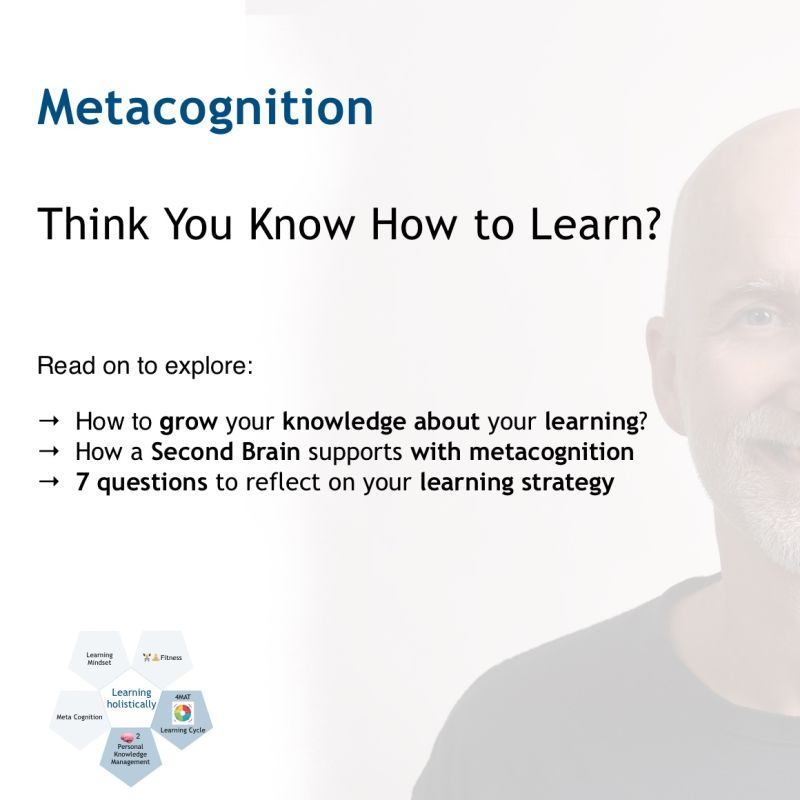MetaCognition and a Second Brain
LinkedIn Post
Think You Know How to Learn?
(How Metacognition Can Take You to the Next Level)
Understanding yourself as a learner is a powerful step to achieve your goals.
Understanding yourself as a learner helps you to:
→ Use study techniques that play to your strengths and mitigate your weaknesses
→ Stay engaged, retain information more effectively, and apply new knowledge
→ Plan better, monitor your progress, and adjust your approach to reach your learning goals
🌱 How can you grow Your Knowledge About Your Learning?
→ You can use a dedicated area in your Second Brain to grow your knowledge about learning itself
→ The “Learning How to Learn” course on Coursera has been a game-changer for my learning
→ Understand your learning type through tests like 4MAT
Documenting your learning strategies helps you remember, grow, and optimize your approach.
Here’s how my Second Brain supports my metacognition:
🧠🧠
→ Self-Reflection: Capture and review thoughts about my learning behaviour. Leading to increased self-awareness and understanding.
→ Organizing information for better connections and recall.
→ Monitoring my projects and goals to evaluate my learning strategies
→ Using templates and checklists to streamline learning and productivity
→ Summarizing and synthesizing key insights and takeaways
🧐 Questions for Self-Reflection on your Learning:
When approaching a new topic, consider these questions to reflect on your learning strategy:
→ What should I do first?
→ Is something confusing me?
→ Could I explain this to someone else?
→ Does this relate to other situations or prior knowledge?
→ Do I need help to understand this?
→ Where did I go wrong?
→ How can I do it better?
How would you describe your approach to learning?
What’s one first step you can take to improve your learning outcomes?
Let’s connect and explore smart approaches together.
Content preparation
- ability to self-critique their approach
- thinking about your thinking
- knowledge of yourself as a learner
- strong metacognition skills, they are more likely to succeed in college, in their careers, and in lifelong learning
- Second Brain: Facilitates this reflection by providing a structured way to capture and revisit your thoughts, notes, and insights. you can maintain a journal or log where you regularly document your reflections on your learning processes.
- Second Brain: Provides a framework to systematically organize your knowledge. This organization makes it easier to see connections between different pieces of information, fostering deeper understanding and better recall.
- Second Brain: Supports this by allowing you to track your projects, tasks, and goals, providing a clear overview of your progress and areas that need improvement.
- Second Brain: Enhances your planning capabilities by storing templates, checklists, and workflows that you can reuse and adapt. This systematization helps streamline your learning and productivity processes.
- Second Brain: Enables this by encouraging you to summarize and synthesize information. Tools like progressive summarization can help you break down complex information into simpler, more digestible parts.
Use Second Brain for learning about your way of learning via:
- Taking time time to reflect and make notes on your reflections
- I regularly use my My running list of 12 favorite problems to reflect
- Document the approach of learning you take
- How do I capture, organize, distill and express my knowledge
- Use AI to analyse your learning topics and ask reflection questions
- look for good reflection questions
- create an area Learning where you grow your knowledge about learning
- Learning how to learn was a great course I took at Coursera that amplifies learning
- observe yourself and understand yourself as a learner
- test like the 4MAT learner type provide great insights about you individual style.
- I’m a What Learner - https://www.linkedin.com/posts/sebastiankamilli_im-definitely-a-what-learner-and-you-exploring-activity-7188431478718889984-fYFp?utm_source=share&utm_medium=member_desktop (see mini 4MAT test later in the comments and contact me for a detailed test)
- understand your own cognitive abilities
When you want to learn something, consider these questions to reflect on your approach
- What should I do first?
- Is something confusing me?
- Could I explain this to someone else?
- Does this relate to other situations or prior knowledge?
- Do I need help to understand this?
- Where did I go wrong?
- How can I do it better?
Dr. John Hattie “Students who actively reflect on their learning processes are more likely to understand complex concepts and retain information longer.”
National Center for Education Statistics indicate that students who use metacognitive strategies have a 15-20% higher retention rate
Posted on LINKEDIN on 2024-06-24_Mon
Linking
- My running list of 12 favorite problems
- [[From Collector to Creator - module One - cognition]]
- [[What is metacognition- (Exploring the Metacognition Cycle)]]
- [[Using Metacognitive Strategies in Education- The Complete Guide]]
- Introducing the 4 Learning Types
